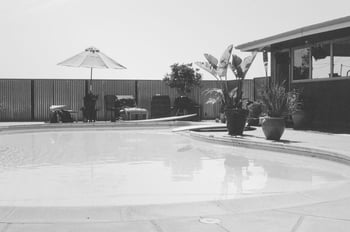You may love your Florida pool but you often don’t think about the energy consumption — and bills — that are a part of pool ownership. You can have a more sustainable pool and reduce your energy costs for the pool by following these five tips.
- Install a Solar Pool Heater
A cool pool is a refreshing treat during a steamy Florida summer, spring, or autumn day. In winter, low temperatures reach the 50s in the Tampa Bay region, so a pool heater helps you enjoy comfortable swimming year-round. However, a gas-fueled or electric-powered pool heater is not the most sustainable way to achieve a cozy pool temperature when the temperatures drop in February.
If you've been thinking of installing or replacing a pool heater, a solar heater is an excellent choice for performance and sustainability. Solar heaters are easy to install in both pools that have never been heated and pools that have existing heaters.
Solar water heaters offer the following benefits:
- Competitively priced (when compared with gas or heat-pump heaters)
- Long-lasting
- Low-maintenance
- Budget-friendly for operating costs
- Energy-efficient
A solar pool heater heats water by circulating filtered pool water through collector panels. The system requires a pump to help circulate the water. In some cases, you may need to upsize your existing pump or purchase a separate pump for the solar heating system.
- Install a Solar Pool Pump
A solar pool pump reduces your pool operating costs and increases pool sustainability by cutting electricity use. Since a pool pump is one of the pool-related appliances that runs the most often, energy savings can be significant when using a solar pool pump.
The best way to ensure that any pool pump is energy-efficient is to size the pump correctly. Too-large pumps use excessive power every time they're turned on, while too-small pumps need to run continuously.
Your solar pool-pump specialist will measure your pool and assess your property to design the most energy-efficient solar pump system for your needs. Combined with a solar pool heater, a well-designed solar pool-pump system can make your pool an oasis of sustainability.
- Manage Your Pool Pump
You don't have to run your pool pump all day, even if you use the pool all day. Unless you're running the pump to warm the water, you can maintain your pool on less pump time than you think.
During the summer, run your pump for six hours per day to keep water clean. In the winter, four hours is sufficient time for the pump to recirculate the water and keep it clean. (Your pump will run longer when circulating water from a solar collector for heating.)
In one study, people who ran their pumps for only three hours per day or less were satisfied with the quality of their pool water. The study participants' average electricity usage for pool-pumping dropped by 60 percent.
- Use Pool Cleaners and Vacuums
Automatic vacuums and cleaners may seem like extravagant power users, but the devices actually help save energy costs for conventional pool pumps by pre-filtering water. A pool pump can run less often when it's being fed cleaner water, whether it's a solar or conventional pump. Less pump use means less wear and tear on the pump, too.
Automatic cleaners and vacuums use far less energy than pumps. Several self-contained, solar-powered automatic skimmers are available to completely eliminate electricity demands from automatic pool-cleaning.
Manually skim your pool every day to assist your automatic vacuums and cleaners. The less work your pump has to do, the less power it must use. Your tidying efforts will help reduce your pool operating costs and improve pool sustainability.
- Use a Pool Cover
If you use a gas- or heat-pump-style pool heater, you can reduce energy costs for pool heating by 50 to 70 percent with one trick. Use a pool cover. Many styles of pool covers are available, so you can find one that's perfect for your swimming setup. Pool covers are recommended for use with solar pool heaters, as well.
Protect the safety of children, adults, and pets by purchasing a pool cover approved by the American Society for Testing and Materials (ASTM). A pool cover with ASTM certification can support up to 4,000 pounds and has other important safety features.
Select a pool cover with durable fabric and construction. The pool cover you choose should be easy to place over the pool and remove from the pool. Look for a pool cover that can be stored conveniently.
Pool covers cut down on the use of chemicals in some pools. Add the lower chemical use to the energy savings for pool heating and filtering, and a pool cover has you covered for sustainability, too.
Install a new pool pump on your Tampa Bay area pool, and meet Florida's recommendations for multi-speed pool pumps by contacting Solar Source today. We offer solar-powered pumps and heaters to help you meet your sustainability goals and enjoy a great Florida lifestyle at the same time.



